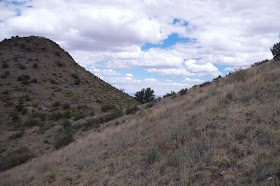


 I have been wanting to explore the upper headwaters of Valles Canyon directly below the very steeply rising Mesa Azur, to see if I could find one more pinon tree surviving in the Sierra de las Uvas. I had found one in the upper reaches of Pine Canyon more than 10 years ago,but every likely place I've looked since then has come up empty.
I have been wanting to explore the upper headwaters of Valles Canyon directly below the very steeply rising Mesa Azur, to see if I could find one more pinon tree surviving in the Sierra de las Uvas. I had found one in the upper reaches of Pine Canyon more than 10 years ago,but every likely place I've looked since then has come up empty.I set off on a cloudy April Sunday afternoon. It seems like we always get one or two of these spring days that are cool enough for desert hiking and I'm usually ready to take advantage when we do. I parked at a little pullout just past the bridge over the dry creek bed of upper Valles and set out quickly marching up the steep, bouldery ravine. There were many, many junipers,but no pinons to be seen.
 I scrambled through the rocks up to a saddle with large boulders and now looked down at the headwater branches of Silva Canyon on the other side. I could see some hang gliders like huge orange and white arrowheads waiting to take off from a ramp-like mountain several hundred feet below me. Unfortunately, for them, it was also one of those rare spring days in southern New Mexico with almost no wind. I decided to extend my hike and now began to make my way down slowly in the rocky creekbed toward the trail that would take me up onto Silva Mesa to the southwest. I had been there a couple of years ago, and I remember bypassing one little canyon that had potential for having rock art, that I have never returned to.
I scrambled through the rocks up to a saddle with large boulders and now looked down at the headwater branches of Silva Canyon on the other side. I could see some hang gliders like huge orange and white arrowheads waiting to take off from a ramp-like mountain several hundred feet below me. Unfortunately, for them, it was also one of those rare spring days in southern New Mexico with almost no wind. I decided to extend my hike and now began to make my way down slowly in the rocky creekbed toward the trail that would take me up onto Silva Mesa to the southwest. I had been there a couple of years ago, and I remember bypassing one little canyon that had potential for having rock art, that I have never returned to.

 I got to the trail, and then the mesa, which to me is one of the most beautiful spots in the range, quickly enough. Initially, I noticed many fragments of chert,flint,jasper, agate and obsidian on the ground covering a large area with only one of the quartz types appearing to be derived from the immediate local area, I speculated that this might be another tool making site. I wandered around the dry grass of the mesa,only just beginning to come back to life, and then made my way down the canyon that I had wanted to look in. I couldn't find any petroglyphs, or grinding holes. Right before it cut through the cliffs, and where I turned around, owing to high enough drop off into exceedingly rough terrain, there was a natural cistern that still held water. This gave me hope because at several places around the Uvas Mountains, rock art and grinding mortars are closely associated with these cisterns carved into the soft, gray volcanic rock( Broad and Valles Canyons, nearby Silva Canyon and another site a couple of miles to the west). Still, I found nothing.
I got to the trail, and then the mesa, which to me is one of the most beautiful spots in the range, quickly enough. Initially, I noticed many fragments of chert,flint,jasper, agate and obsidian on the ground covering a large area with only one of the quartz types appearing to be derived from the immediate local area, I speculated that this might be another tool making site. I wandered around the dry grass of the mesa,only just beginning to come back to life, and then made my way down the canyon that I had wanted to look in. I couldn't find any petroglyphs, or grinding holes. Right before it cut through the cliffs, and where I turned around, owing to high enough drop off into exceedingly rough terrain, there was a natural cistern that still held water. This gave me hope because at several places around the Uvas Mountains, rock art and grinding mortars are closely associated with these cisterns carved into the soft, gray volcanic rock( Broad and Valles Canyons, nearby Silva Canyon and another site a couple of miles to the west). Still, I found nothing.
 I headed back on the easy to follow cow trail which leads eventually to Valles Tank,but got me to the road. I thought, once again, how this is a perfect, ready made hiking trail for the Organ Mountains/ Desert Peaks National Monument.
I headed back on the easy to follow cow trail which leads eventually to Valles Tank,but got me to the road. I thought, once again, how this is a perfect, ready made hiking trail for the Organ Mountains/ Desert Peaks National Monument.


No comments:
Post a Comment